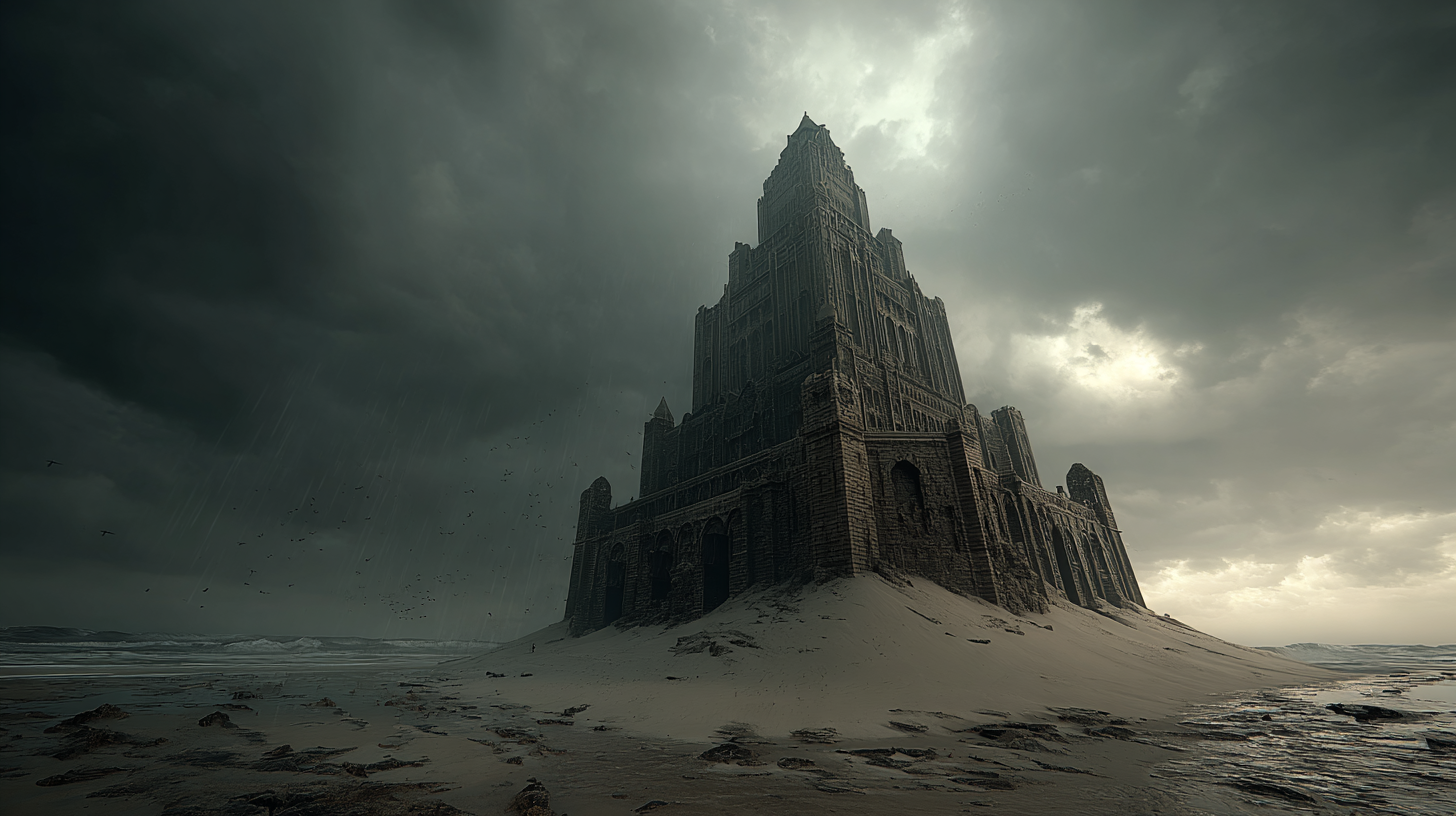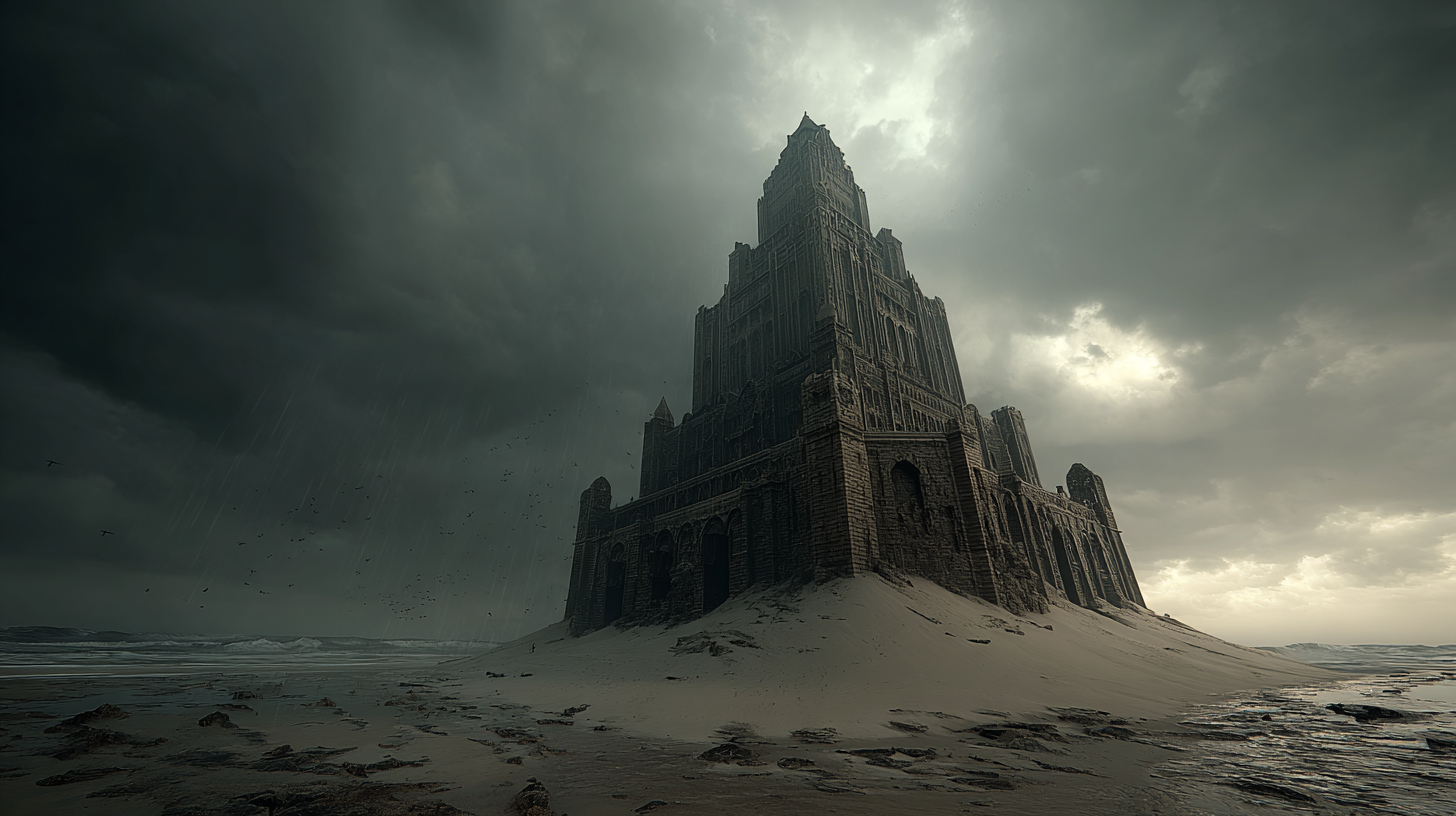The Sixth Mirror: The House of Sand
The sixth mirror is the parable of the House of Sand. It diagnoses every empire and ideology built on false assumptions, revealing that the real threat is not the enemy at the gates but the dissolution of the ground beneath our feet. Actual collapse comes not from attack, but from within.


On the sixth night, exhausted from five nights of visions, he climbed to the very peak of his tower to rest. But as he looked down at his great achievement, the Tiger's fire showed him a terrible truth: his entire edifice was built on sand.
The vision was the simplest and most devastating:
A house by the sea, magnificent in appearance, fortified against every visible threat. Its walls could withstand any assault, its gates could repel any invader. The builder had prepared for every enemy except the ground beneath his feet.
When the storm came, it brought no mighty waves to batter the walls, no winds to tear the roof. It brought only rain; patient, persistent, penetrating rain that found every tiny crack, every microscopic flaw. The rain didn't attack the house; it dissolved its foundation.
The house didn't fall in battle. It simply sank, all its strength becoming its weight, pulling it down into the mud that had once seemed like solid ground.
He understood then that his own tower, this monument to success and certainty, was built on the sand of assumptions that the coming rain would wash away. The old world was not dying from attack but from a change in the weather itself, a shift in consciousness that would dissolve every foundation not built on bedrock truth.
He turned from the window to his desk, and wrote with the terrible clarity of one pronouncing his own doom:
There was once a house built near the ocean. The builder did not put in the effort of constructing it properly, and instead, chose to build it near a sandy beach. One day, a powerful storm came, and though the waves were not large enough to erode it, the torrential downpour washed the house back into the sea.
He set down his pen and stared at the brief parable. Four sentences to describe the death of every empire, every ideology, every system built on expedience rather than truth.
The builder's error wasn't in the construction but in the foundation. He had built for efficiency, for speed, for visible impressiveness. He had fortified against obvious threats: the waves that everyone could see coming. But he had ignored the ground itself, the very basis of his creation.
The Tiger's fire showed him how this was the story of his own tower, his own empire, perhaps the entire civilization he belonged to. They had built magnificent structures of law, economy, technology, all on the sand of assumptions about human nature, about value, about meaning. They had prepared for every external threat while ignoring the internal dissolution that was already beginning.
The rain was coming. Not as enemy but as change itself; a shift in consciousness so fundamental that every structure not built on bedrock truth would sink: no battle, no defeat, just obsolescence. The old world wouldn't be conquered; it would be rendered impossible by a change in the very ground of being.
This sixth mirror would show souls that their mightiest fortresses were also their greatest vulnerabilities, that strength without a proper foundation became a weight that accelerated sinking. It would reveal that the real threat was never the enemy at the gates but the assumptions in the basement.
This parable is an excerpt from the forthcoming work, The Book of Korm: After Zarathustra.
A Final Thought...
This exploration is a reader-supported publication. It is sustained entirely by the generosity of readers like you who believe in the value of this inquiry.
If you found meaning in this piece, please consider becoming a paid supporter. Your contribution, no matter the size, makes this work possible and keeps it accessible to all.
Thank you for reading.
Author
Sign up for The (all) Unknowing newsletters.
Stay up to date with curated collection of our top stories.